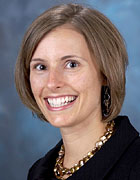Orthoptics
The Orthoptic service specializes in the evaluation and treatment of patients with disorders of the visual system with an emphasis on binocular vision and eye movements. Orthoptic services include diagnostic tests and measurements on both pediatric and adult patients with disorders of binocular vision and/or visual function deficits. Disorders include amblyopia (lazy eye), strabismus (misaligned eyes), double vision, and visual discomfort.
The Orthoptic Service at Loyola University Medical Center commonly works alongside the Oculoplastic, Neuro, and Pediatric Ophthalmologists. However, the Orthoptist can evaluate patients when they come in to see any of the Ophthalmology subspecialties.
What is an Orthoptist?
Orthoptics is a specialized field of eye care pertaining to the evaluation and treatment of pediatric and adult patients with abnormalities of binocular vision and visual disorders of childhood. Certified Orthoptists are uniquely skilled in diagnostic techniques, clinical interpretation, and therapeutic modalities. Orthoptists commonly work with children along with pediatric ophthalmologists. Adult care in this field is typically found in settings with a neuro-ophthalmologist or adults with complicated eye muscle disorders.
Common Conditions Addressed by Orthoptists
- Strabismus
- Esotropia
- Exotropia
- Hypertropia
- Cranial Nerve Palsies (Eye muscle palsies)
- III
- IV (Superior Oblique)
- VI (Lateral Rectus)
- Crossed or Drifting Eyes
- Diplopia (Double Vision)
- Amblyopia (Lazy Eye)
- Prisms
- Eye Movement Disorders

Rebecca Parrish, CO
Pediatric Ophthalmology and
Adult Strabismus
Clinical Interests
- Pediatric Ophthalmology
- Adult Strabismus
Locations
Loyola Outpatient Center
Loyola Center for Health at Oakbrook Terrace North
